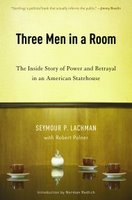What kept Carl Kruger untouchable: member items, and the redistricting that carved up territory for him and Marty Golden
In the wake of the charges against state Senator Carl Kruger and others, it's worth another look at my 10/30/06 review of former State Senator Seymour Lachman's timely book of analysis and advocacy, Three Men in a Room: The Inside Story of Power and Betrayal in an American Statehouse, coauthored by Robert Polner. Indeed, the entire legislative and governmental process is distorted by an absence of democracy.
 As I wrote, few of our elected representatives come off well. Is it no surprise that several of the officials who back the Atlantic Yards plan are among those who benefit from and support the systematic dysfunction?
As I wrote, few of our elected representatives come off well. Is it no surprise that several of the officials who back the Atlantic Yards plan are among those who benefit from and support the systematic dysfunction?
Member items
How do leaders keep people in line and maintain incumbency?
“Member items,” basically a discretionary fund that can be used for worthy civic purposes and also to build political capital. In the Republican-controlled Senate, a minority Democrat might get $100,000 to $200,000 to distribute to local community groups and local services, Republicans sometimes get ten times more. (In the Democrat-controlled Assembly, the flip side obtains.)
Those grants, which may serve civic purposes but are never evaluated, help incumbents stay in office—and when Lachman announced plans to retire, his slush fund dried up.
Lachman recounts how Bruno tried to recruit him to the Republican Party or to vote with the party by offering $2 million to $3 million in additional member items. He said no. His district was carved up, and was designed to stretch over to Staten Island.
Kruger's benefit
Lachman reports how Brooklyn Senator Carl Kruger, a Democrat, campaigned for Republican Marty Golden in return for new district boundaries that protected his seat. Golden, an Irish-American Republican, beat Vincent Gentile, an Italian-American Democrat.
Gentile couldn’t even get support from the Federation of Italian American Organizations, which had backed him in the past, because Bruno had pushed $2 million to Golden to offer the federation.
(Update: I've pointed to Golden as the legislator whose Atlantic Yards support is, like that of Kruger, seemingly anomalous in the contrast between distance from site and fervency.)
Need for redistricting
In Albany, gerrymandering works on behalf of each party--that which controls each respective legislative body. Thus, “bipartisan,” Lachman writes, “means in effect that each party lets the other one do as it wishes I the chamber it dominates.” He calls for the obvious: an independent, nonpartisan commission to oversee redistricting.
Update: As of last week, redistricting efforts are stalled in the New York State Legislature.
Also see Tom Robbins' piece in today's New York Post about indicted state Senator Pedro Espada, Kruger's closest political ally, who flaunted his wealth while representing a poor community, and switched party allegiances based on the allocation of member items (i.e., "pork") he could steer to affiliated nonprofits. Espada was supported significantly by the real-estate industry, which wanted him to roll back rent regulations.
 As I wrote, few of our elected representatives come off well. Is it no surprise that several of the officials who back the Atlantic Yards plan are among those who benefit from and support the systematic dysfunction?
As I wrote, few of our elected representatives come off well. Is it no surprise that several of the officials who back the Atlantic Yards plan are among those who benefit from and support the systematic dysfunction?Member items
How do leaders keep people in line and maintain incumbency?
“Member items,” basically a discretionary fund that can be used for worthy civic purposes and also to build political capital. In the Republican-controlled Senate, a minority Democrat might get $100,000 to $200,000 to distribute to local community groups and local services, Republicans sometimes get ten times more. (In the Democrat-controlled Assembly, the flip side obtains.)
Those grants, which may serve civic purposes but are never evaluated, help incumbents stay in office—and when Lachman announced plans to retire, his slush fund dried up.
Lachman recounts how Bruno tried to recruit him to the Republican Party or to vote with the party by offering $2 million to $3 million in additional member items. He said no. His district was carved up, and was designed to stretch over to Staten Island.
Kruger's benefit
Lachman reports how Brooklyn Senator Carl Kruger, a Democrat, campaigned for Republican Marty Golden in return for new district boundaries that protected his seat. Golden, an Irish-American Republican, beat Vincent Gentile, an Italian-American Democrat.
Gentile couldn’t even get support from the Federation of Italian American Organizations, which had backed him in the past, because Bruno had pushed $2 million to Golden to offer the federation.
(Update: I've pointed to Golden as the legislator whose Atlantic Yards support is, like that of Kruger, seemingly anomalous in the contrast between distance from site and fervency.)
Need for redistricting
In Albany, gerrymandering works on behalf of each party--that which controls each respective legislative body. Thus, “bipartisan,” Lachman writes, “means in effect that each party lets the other one do as it wishes I the chamber it dominates.” He calls for the obvious: an independent, nonpartisan commission to oversee redistricting.
Update: As of last week, redistricting efforts are stalled in the New York State Legislature.
Also see Tom Robbins' piece in today's New York Post about indicted state Senator Pedro Espada, Kruger's closest political ally, who flaunted his wealth while representing a poor community, and switched party allegiances based on the allocation of member items (i.e., "pork") he could steer to affiliated nonprofits. Espada was supported significantly by the real-estate industry, which wanted him to roll back rent regulations.
Comments
Post a Comment